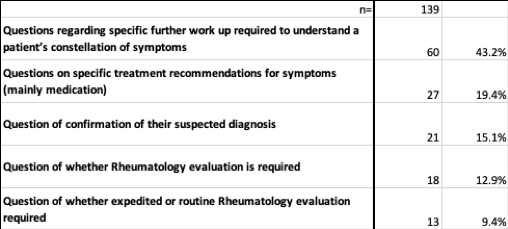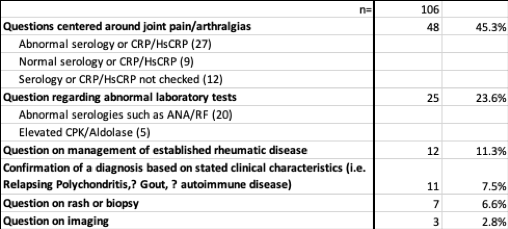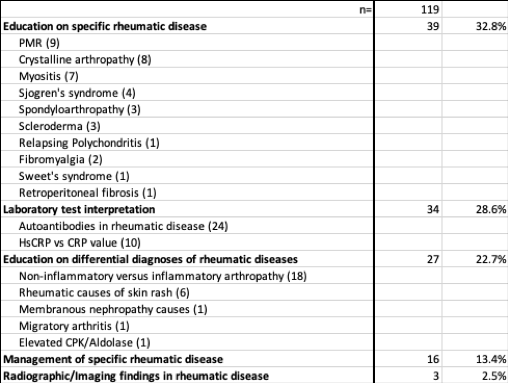Session Information
Date: Monday, November 11, 2019
Title: 4M089: Education (1794–1799)
Session Type: ACR Abstract Session
Session Time: 2:30PM-4:00PM
Background/Purpose: Despite advancements in management of rheumatologic diseases, barriers still exist for timely access to care. Electronic consultation (eConsult) use has increased in response to positive outcomes such as increased ability for primary care physicians (PCPs) to manage patient care, decreased wait time for subspecialty visits, and satisfaction of PCPs. Studies have also investigated common eConsult diagnoses along with which types of questions were associated with recommendations for subsequent Rheumatology outpatient consultations.
eConsults also provide a forum of education by providing immediate feedback and by developing educational content based on common themes stemming from PCP questions. The objective of our study was to identify these themes and knowledge gaps in PCP’s understanding of rheumatic diseases which may be used to improve patient care.
Methods: We performed a qualitative analysis of eConsult encounters from 2018-2019. Conventional content analysis was used to explore themes in eConsult communication from 1) questions posed by the PCP and 2) the recommendations provided by the Rheumatologist eConsultant. Each eConsult question and response could contain multiple themes. We also investigated if the Rheumatologist eConsultant recommended a visit following the eConsult.
Results: We reviewed 102 eConsult communications, 18% provided recommendations without a need for a face-to-face rheumatology appointment. The most common question types by the PCP were: further work up required to understand a patient’s constellation of symptoms (43%), treatment recommendations for patient’s symptoms (19%), and diagnosis confirmation based on patient’s clinical history (15%). Within these question types, the following themes in question content were the most prevalent: joint pain/arthralgias (45%), abnormal autoantibody or inflammatory markers (24%), and management of an established rheumatic disease (11%). Table 2.
The most common educational recommendations provided by the Rheumatology eConsultant included: education on specific rheumatic diseases (33%, PMR most common), laboratory test interpretation (29%, autoantibody analysis most common), and differential diagnoses of rheumatic diseases (23%, features of non-inflammatory vs. inflammatory arthritis most common). Table 3.
The following knowledge gaps were identified: overdiagnoses of PMR, use of CRP and HsCRP interchangeably, and differentiation between inflammatory and non-inflammatory arthritis prior to lab testing.
Conclusion: This analysis of eConsult communication revealed common themes in both PCP questions and Rheumatologist recommendations. This knowledge may lead to focused educational opportunities, with greater understanding of rheumatic diseases and reduction in unnecessary lab testing. A larger proportion of eConsult questions required an outpatient visit than previously reported at other institutions. This highlights the importance of a detailed physical exam and subtle history in rheumatic disease diagnosis which often requires face to face visits with patients rather than relying solely on lab testing. This was a common teaching theme seen in our eConsults.
To cite this abstract in AMA style:
Jain R, Broder A, Rikin S. Identifying Educational Themes and Knowledge Gaps Through Analysis of Electronic Consultation (eConsult) Communication Between Primary Care Physicians and Rheumatologists [abstract]. Arthritis Rheumatol. 2019; 71 (suppl 10). https://acrabstracts.org/abstract/identifying-educational-themes-and-knowledge-gaps-through-analysis-of-electronic-consultation-econsult-communication-between-primary-care-physicians-and-rheumatologists/. Accessed .« Back to 2019 ACR/ARP Annual Meeting
ACR Meeting Abstracts - https://acrabstracts.org/abstract/identifying-educational-themes-and-knowledge-gaps-through-analysis-of-electronic-consultation-econsult-communication-between-primary-care-physicians-and-rheumatologists/



